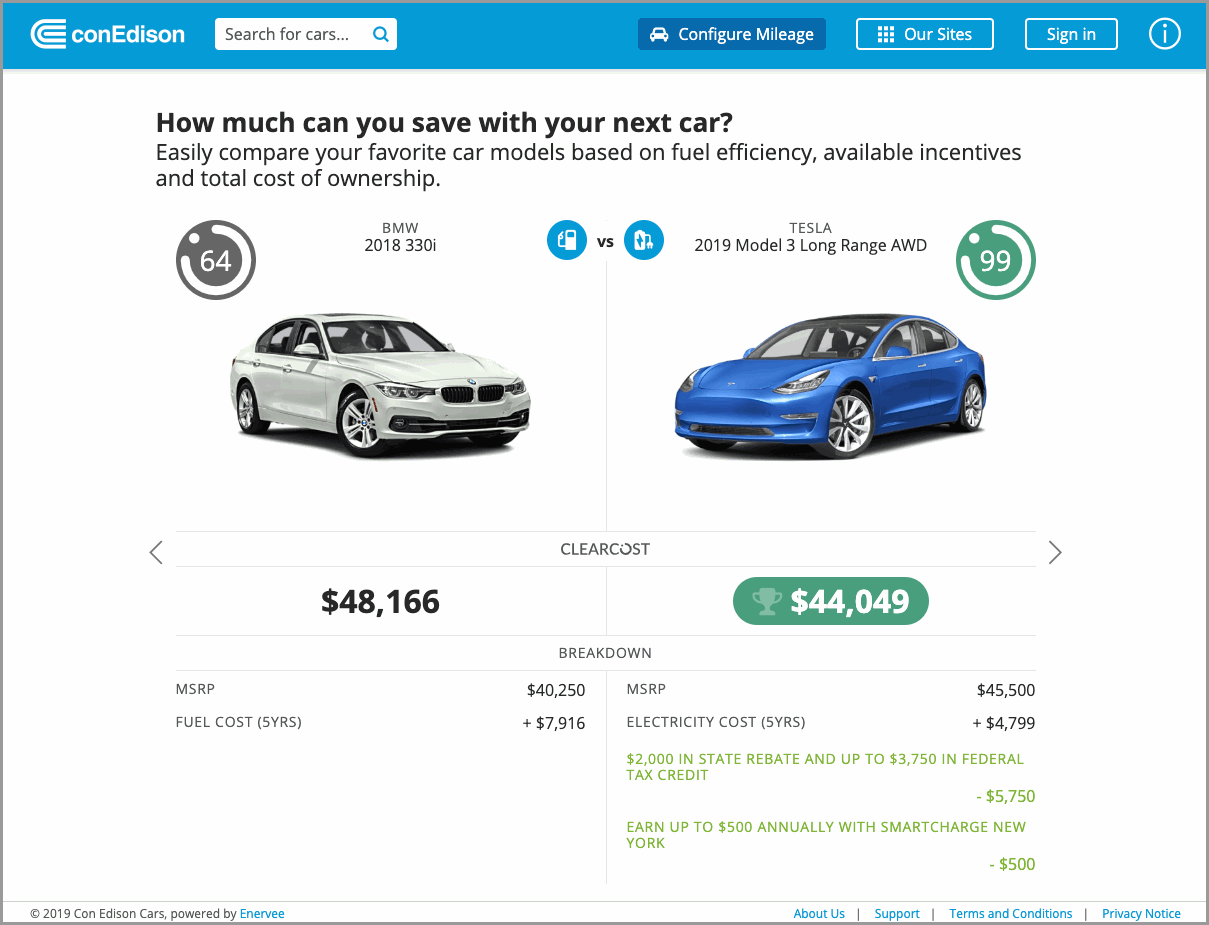You’re in the market for a new car. And you’ve heard lots about electric cars. Lots. They’re coming, everyone says. They’ve arrived, others say. You’re keen to do the right thing (by the planet and by your wallet) but it’s tough to get a complete and credible view of your options as a shopper. Range, running costs, purchase price, charging options, incentives… It’s complicated when the world makes a change in terms of how we all get around on this scale.
To help car shoppers navigate this complex — but exciting — space, we here at Enervee (we’re a CA-based energy-tech company) have launched our latest choice engine — Enervee Cars.

Like Enervee Appliances and Enervee Lighting before it, Enervee Cars has a simple mission: to help shoppers make the best energy-smart choice when buying a new car.
And at the close of last month, Enervee Cars was launched with the first of its US utility clients including Con Edison.
Why Choice Engines Matter
Enervee wants to influence purchase decisions, to benefit the consumer and the planet. And it wants to do this through providing a better choice environment — that means clearer and simpler choices on the factors that matter.
To do this, Enervee Cars brings together three sources of data to provide the richest, most intuitive and most useful decision-aid for consumers. First, there are all the current market data in terms of car specifications, pricing and incentives. Second, there are data not found anywhere else online. This is the efficiency of every car in relation to every relevant alternative. Enervee presents these data in the form of the Enervee Score (the closer to 100, the more efficient the option compared to all the others). And third, there are personal data; consumer-specific data inputted at the time of making the decision. This can include typical mileage, town or city driving, proposed length of ownership and — importantly in the case of EVs — current electricity tariff. Together, these data create a choice environment for the consumer that at the very least reveal the potential benefits of making a better choice.
With Enervee Cars there are a number of other features which make the experience unique:
Enervee Score for Cars
Enervee launched its Enervee Score on its Appliances choice engine back in 2013. As a 0–100 rating for relative efficiency, it’s since been proven to systematically and significantly influence buying decisions. These effects have been documented in peer-reviewed journals and have been the focus of independent analysis in the field, revealing energy-savings and consumer engagement on an impressive scale. In short, the Enervee Score works — both for energy savings, and for consumer buy-in and engagement.
For Enervee Cars, the score delivers a similar decision-aid for car shoppers. Shown with every model available in the US car market, the Enervee Score for Cars shows how any particular model rates in terms of fuel usage and emissions for all other comparable models. Crucially, ‘comparable’ in the context of cars means cars of similar size and performance.
ClearCost
Enervee Cars ClearCost makes it completely transparent for the car shopper to see what a car will cost to own and run in comparison to relevant others. ClearCost takes into account purchase price, discounts and incentives and running costs over a period of proposed ownership as chosen by the consumer. The result is a clear and personalized view of what that car will cost to own. This is particularly important, as it makes it clear to shoppers that EVs needn’t cost more to buy, making the switch to EV even more compelling. We’ll say it again: EV’s needn’t cost more to buy.

Compare all engine types
We know that once you get outside the bubble of EV fanatics, most people (over 70%, by one recent study) cannot name a single EV brand and model. So to only compare EVs would be to ignore almost all car shoppers (Enervee research also reveals that around only 1% of internet traffic for car searches heads to EV-specific sites).
This is why Enervee Cars allows users to search and compare all car types in the market — gasoline, diesel and electric. Conceptually, this is important for Enervee in order to respect consumer sovereignty. Practically, it allows EV choices to shine even more — it’s remarkable how attractive the EV proposition can become when you can clearly compare it to more traditional alternatives.
Because it’s about so much more than the car
Enervee’s own research shows that the decision to switch to EV is about a lot more than just the car. Crucial factors include charging options, possible EV-specific electricity tariffs and even the installation of solar to drive down the costs of charging. Recognizing that all of these aspects play a part in the buying decision, Enervee Cars provides shoppers with the option to seamlessly explore and understand these aspects (and to go ahead and make the purchase).

